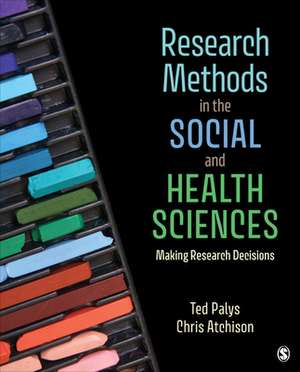Research Methods in the Social and Health Sciences: Making Research Decisions
Autor Ted Palys, Chris Atchisonen Limba Engleză Paperback – 12 mai 2021
Preț: 733.95 lei
Preț vechi: 991.83 lei
-26% Nou
140.44€ • 153.03$ • 118.34£
Carte disponibilă
Livrare economică 03-17 aprilie
Livrare express 19-25 martie pentru 59.64 lei
Specificații
ISBN-10: 1544357672
Pagini: 752
Dimensiuni: 187 x 232 x 37 mm
Greutate: 1.41 kg
Ediția:1
Editura: SAGE Publications
Colecția Sage Publications, Inc
Locul publicării:Thousand Oaks, United States
Cuprins
Chapter 2: Getting Started: Developing Research Ideas
Chapter 3: Getting Specific: What's the Plan?
Chapter 4: Ethics in Social and Health Research
Chapter 5: Sampling and Recruitment
Chapter 6: Eliminating Rival Plausible Explanations: The Experiment
Chapter 7: From Manipulative to Analytic Control: Quasi-Experimentation
Chapter 8: Case Study Approaches
Chapter 9: Surveys and Questionnaires
Chapter 10: Interviews
Chapter 11: Observation, Ethnography & Participatory Action Research
Chapter 12: Archival Sources
Chapter 13: Analyzing Non-Numerical Data
Chapter 14: Analyzing Numerical Data
Chapter 15: Disseminating Your Research
Appendix A
Appendix B
Appendix C
References
Notă biografică
Ted Palys is a social science researcher, methodologist and Professor at Simon Fraser University in Vancouver, Canada. His methodological interests go beyond the pragmatics of design and analysis to include implications of research policy changes on the sociology of knowledge. One focus was on of the impacts of the development of national codes of ethics and review and how institutions dealt with legal threats to research confidentiality (see Protecting Research Confidentiality: What Happens When Law and Ethics Collide, 2014, with co-author John Lowman). He was one of five academics from across the country appointed by the Presidents of Canadäs federal granting agencies to advise them how to improve Canadäs federal ethics policy¿s consideration of research in the social sciences and humanities. More recently, his concerns with surveillance capitalism as the economic model for the internet have led him into the realm of internet governance, and the threat that model holds for our ability to protect research participants while doing research in controversial areas that often have the greatest need for empirically-derived information on which to develop and evaluate law and policy alternatives.
